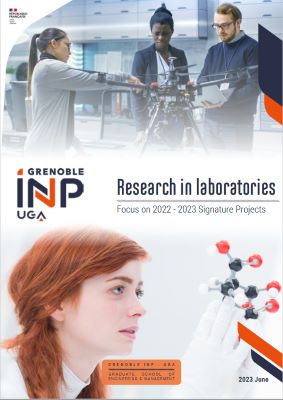Developing a new technology for the fabrication of low-cost integrated biosensors and gas sensors for medical applications: this is the ambitious objective which will be pursued by a unique multidisciplinary team of scientists and engineers from four European countries and five Research institutions, Universities and industrial R&D labs.
The project started on 1st February 2016 for three years under the leadership of the French lab consortium for nanoelectronics, FMNT, from Grenoble INP, in the framework of the EC funded project “Nanonets2Sense” (Project n°688329).
The field of pre-diagnostic and monitoring of diseases or metabolic disorders is evolving rapidly with the development of new decentralized, fast and easy-to-use tools for the detection of specific molecules in biological fluids such as blood or breath.
Ultimate goal: to get fast point-of-care analysis near the patient, in the hospital, in the ambulance, at home or even in wearable patches.
The core of this project is to propose a completely new technological approach, based on the use of nanonets, which consist of random networks of nanowires. Nanonets are providing the performance advantage of crystalline nanowires together with easy co-integration with read-out and conditioning electronics. They are fabricated using very low-cost methods and can be further processed using a 3D above-IC integration scheme suitable for high volume microelectronic applications.
The Nanonets2Sense project builds upon the strong expertise of the academic partners (FMNT-Grenoble INP, France and Kungliga Tekniska Hoegskolan, Sweden) in material chemistry, bio chemistry, and in the physics and technology of advanced devices and circuits. Grenoble INP patented the sintering technique, which brought the initial breakthrough by increasing nanonets adherence and electrical conductance (Patent n° FR 14 61326). Industrial relevance as well as future exploitation are guaranteed by the involvement of a large company (ams AG, Austria) offering leading CMOS foundry services for high volume sensors manufacturing and an SME specialized in breath analysis and gas sensing solutions (Cambridge CMOS Sensors – UK). The SINANO Institute will set up effective strategies for dissemination of project results and completes partners list.
Read more about the project on: http://www.nanonets2sense.eu/.
The project started on 1st February 2016 for three years under the leadership of the French lab consortium for nanoelectronics, FMNT, from Grenoble INP, in the framework of the EC funded project “Nanonets2Sense” (Project n°688329).
The field of pre-diagnostic and monitoring of diseases or metabolic disorders is evolving rapidly with the development of new decentralized, fast and easy-to-use tools for the detection of specific molecules in biological fluids such as blood or breath.
Ultimate goal: to get fast point-of-care analysis near the patient, in the hospital, in the ambulance, at home or even in wearable patches.
The core of this project is to propose a completely new technological approach, based on the use of nanonets, which consist of random networks of nanowires. Nanonets are providing the performance advantage of crystalline nanowires together with easy co-integration with read-out and conditioning electronics. They are fabricated using very low-cost methods and can be further processed using a 3D above-IC integration scheme suitable for high volume microelectronic applications.
The Nanonets2Sense project builds upon the strong expertise of the academic partners (FMNT-Grenoble INP, France and Kungliga Tekniska Hoegskolan, Sweden) in material chemistry, bio chemistry, and in the physics and technology of advanced devices and circuits. Grenoble INP patented the sintering technique, which brought the initial breakthrough by increasing nanonets adherence and electrical conductance (Patent n° FR 14 61326). Industrial relevance as well as future exploitation are guaranteed by the involvement of a large company (ams AG, Austria) offering leading CMOS foundry services for high volume sensors manufacturing and an SME specialized in breath analysis and gas sensing solutions (Cambridge CMOS Sensors – UK). The SINANO Institute will set up effective strategies for dissemination of project results and completes partners list.
Read more about the project on: http://www.nanonets2sense.eu/.
Agenda
November 6-7th 2018: International Workshop "Semi-conducting Nanomaterials for Health, Environment and Security Applications" Grenoble, France.
June 22, 2016: Progress meeting at KTH - Stockholm (Sweeden)
November 15, 2016: 1st Review meeting at EU - Brussels (Belgium)
February 2nd, 2017: Progress meeting at AMS - Premstätten (Austria)
June 30, 2017: meeting of the Advisory Board and progress meeting - Lyon (France)
October 11, 2017: Mid-term Review at EU - Brussels (Belgium)




